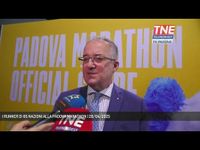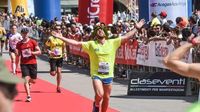On April 27, 2025, the picturesque city of Padova was transformed into a vibrant hub of athleticism and community spirit as it hosted the highly anticipated 25th edition of the Padova Marathon. This year’s event marked a significant milestone, featuring an impressive turnout of over 35,000 participants across various races, including the classic marathon, half marathon, and several non-competitive Stracittadine races.
The marathon weekend kicked off with a grand presentation of top runners, setting the stage for a thrilling competition. Among the highlights was the participation of fifty heart transplant recipients and cardiac patients from the Department of Cardio-Thoracic-Vascular Sciences and Public Health at the University of Padua. These brave individuals ran alongside their doctors, showcasing resilience and the vital role of physical activity in recovery. "This participation represents a powerful message of hope and determination," said Professor Alessandro Zorzi and Dr. Chiara Tessari, who promoted the initiative. "It demonstrates that with the right care and support, it is possible not only to survive serious heart conditions but also to return to a full and active life."
The marathon featured a variety of events, including a new 10 km timed non-competitive race, known as the 10Crono, which added to the excitement of the weekend. Runners from 65 countries participated, making this edition a record-breaking event in terms of international representation. "We have exceeded our wildest expectations; 35,000 people is a historic result that we should all be proud of," remarked Diego Bonavina, the city’s sports and safety councilor.
As the sun shone brightly over Padova, the atmosphere was electric with anticipation. The event was not just a race; it was a celebration of community, health, and perseverance. The presence of medical professionals alongside patients during the marathon underscored the strong bond formed within the healthcare community, emphasizing an holistic approach to care that extends beyond hospital walls.
In addition to the heartwarming stories of the participants, the marathon also served as a platform for scientific research. The Cardiology of Sport group, led by Professor Zorzi, conducted a groundbreaking study titled "Association between effort arrhythmias during a marathon and production of catecholamines." This study involved 100 marathon runners who volunteered to provide urine samples before and after the race, allowing researchers to analyze the effects of exercise on heart rhythm and hormone production.
During the marathon, these athletes were monitored using a small electrocardiogram device applied to the skin, allowing researchers to gather crucial data on how hormones like adrenaline can impact heart rhythm during intense physical activity. This research is particularly significant in understanding the causes of arrhythmias in athletes, which can sometimes lead to severe outcomes such as cardiac arrest. The initiative reflects a broader commitment to athlete safety and health, backed by experts like Professor Domenico Corrado and Professor Cristina Basso.
The marathon also had logistical support from the Italian Army, with over 130 participants from the Comando Forze Operative Nord joining in the festivities. Their involvement highlighted the collaborative spirit of the event, which brought together various institutions, local businesses, and volunteers to create a seamless experience for all involved.
As the races commenced, the Fanfara of the 11th Bersaglieri Regiment provided a stirring musical backdrop, adding to the celebratory atmosphere. The start of the marathon witnessed an impressive display of community spirit, with families, friends, and first-time runners all coming together to cheer on the participants.
In the competitive races, Enock Onchari from Kenya clinched victory in the marathon with an impressive time of 2 hours, 11 minutes, and 47 seconds, narrowly edging out Uganda’s Viktor Kwemboi. Meanwhile, in the half marathon, Castor Mogeni, also from Kenya, finished strong with a time of 1 hour, 2 minutes, and 38 seconds. These performances not only showcased the extraordinary talent of the athletes but also reaffirmed Padova’s status as a premier marathon destination.
Despite the competitive edge, the marathon was ultimately a celebration of life and health. The stories of the heart patients participating alongside professional athletes served as poignant reminders of the human spirit’s capacity to overcome adversity. Each runner, whether they were racing for personal bests or simply to complete the course, contributed to a collective narrative of hope and resilience.
The Padova Marathon is more than just a sporting event; it is a testament to the power of community, the importance of health, and the joy of running. As the dust settles on this year’s edition, the echoes of cheers and the spirit of camaraderie will linger long after the last runner crosses the finish line. The city of Padova has once again proven that it is not only a place for sporting excellence but also a community that supports and uplifts one another through the shared experience of running.
The success of the Padova Marathon 2025 sets a high bar for future events, and as organizers begin to plan for next year’s race, the excitement and anticipation are already building. With a record number of participants and a commitment to health and community, the Padova Marathon is poised to continue its legacy as a beloved event in the hearts of runners and spectators alike.





